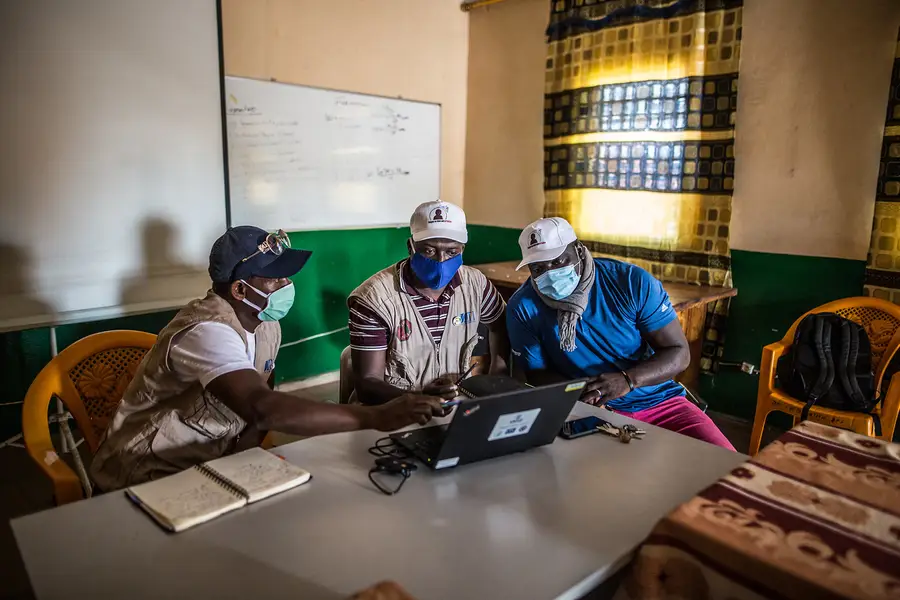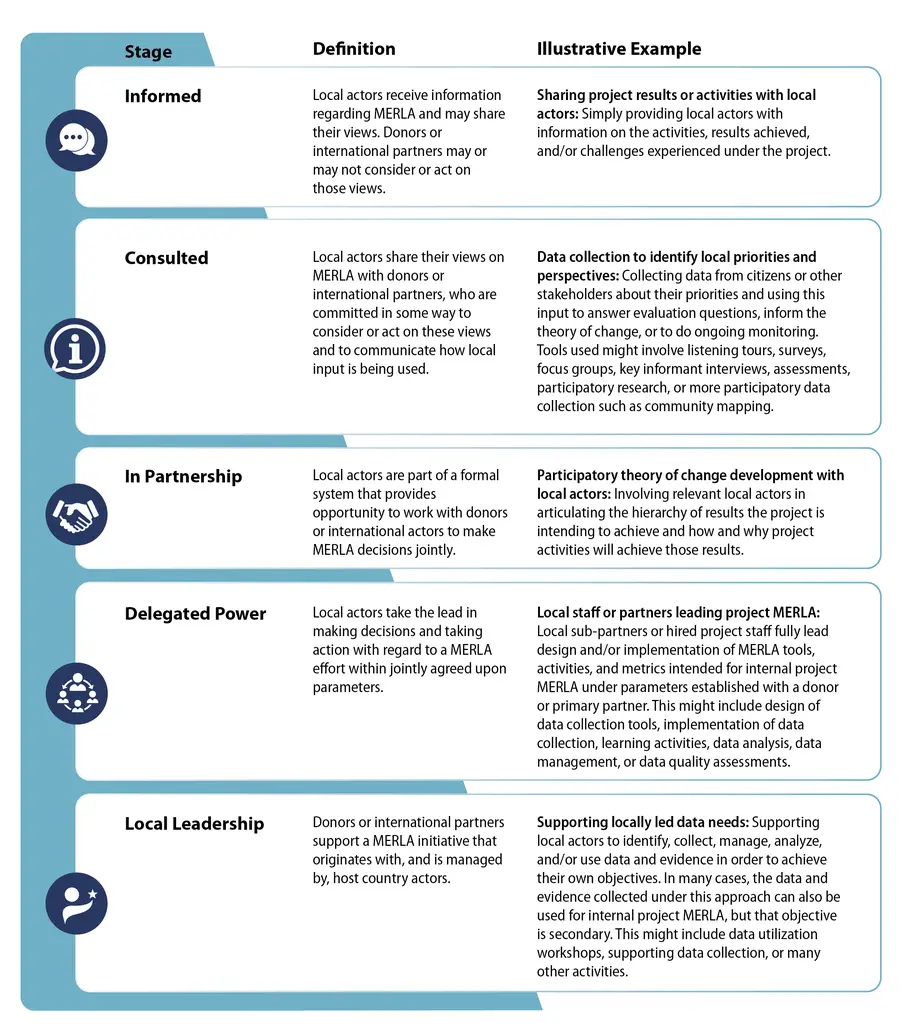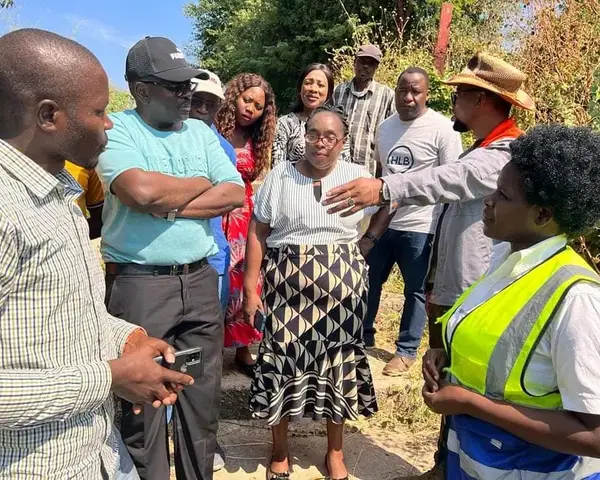Locally Led MERLA: A Framework for Bringing Local Voices and Knowledge to the Forefront

Jessica Henson Cagley
Advisor, Monitoring, Evaluation, Research, Learning, and Adapting (MERLA)
This blog is the first in our series on locally led MERLA (Monitoring, Evaluation, Research, Learning, and Adapting). Below we share insights from locally led MERLA approaches and learnings, and how these approaches can advance locally led development. Scroll to the bottom to see examples from MERLA experts on integrating a locally led MERLA approach in the projects they support.
Various efforts and initiatives to advance locally led international development have come and gone over recent decades. Despite their differing nomenclature (e.g., participatory development, journey to self-reliance, equitable partnership, or USAID’s most recent initiative on locally led development), all have espoused the importance of development being owned and implemented by those closest to the challenges that the international development efforts aim to address.
RTI is committed to fostering locally led solutions to development challenges. We have seen first-hand that the most equitable, effective, and sustainable development solutions are created with and championed by those who have the most in-depth understanding of how to improve lives and livelihoods in their own communities.
As a key component of international development programs, Monitoring, Evaluation, Research, Learning, and Adapting (MERLA) can either advance or hinder locally led development. Approached poorly, MERLA can be done in a top-down, rote, and time-intensive way that provides little value to local actors, reinforces existing power dynamics, or worse, can prevent those actors from being heard. But when done well, we believe that MERLA can shift power to local leadership, bringing local voices and local knowledge to the forefront. As USAID states in its Local Capacity Strengthening Policy, “by moving the locus of learning and adaptation closer to local stakeholders, USAID can support local leadership and ownership.”

Photo credit: Sadak Souici for RTI International
In support of this belief, RTI has tried new approaches to not only capture the voices of local actors, but to support their ability to collect, interpret, and use data for more informed decision-making that elevates their leadership.
For example, the USAID-funded Feed the Future Senegal Naatal Mbay (“flourishing agriculture”) project (2015–2019) supported farmer networks to collect and track accurate data on field size, planting methods, timing, spacing, and rainfall using open-source software and GPS-enabled devices. The project also supported farmer organizations’ data literacy through data dashboards and inclusive evidence-based learning forums. Ultimately, these organizations were able to use these data and skills to compare results across years, inform strategic farm planning, access financial products, and advocate for policy change. After the project ended, during the COVID-19 pandemic, these farmer networks were able to use these skills and data to maintain resilience, including to provide estimates of input needs to their suppliers and bankers that allowed leaders to negotiate procurements and lines of credit remotely.
We have also brought partners together for locally led MERLA learning events to advance the field. In 2018 and 2019, RTI hosted three “Learning Summits” bringing hundreds of individuals together in the Philippines, Uganda, and Washington, DC, to share experiences related to MERLA across countries. These events repeatedly emphasized the importance of local actor ownership of learning efforts for successful outcomes.
In December 2021, RTI continued the conversation by hosting a webinar on Locally Led MERLA Solutions, where partners from multiple countries discussed different approaches to putting locally led MERLA into practice in ways that shift power to local actors. And just this May, RTI hosted a learning exchange in Nairobi, Kenya, with more than 70 staff and partners from 5 countries, to discuss promising practices in locally led development. MERLA-focused conversations included local data ownership, measuring organizational resilience, and metrics for understanding local ownership and engagement.
Insights on Locally Led MERLA from RTI Learning Exchanges
As we have gathered experience implementing and learning from various locally led MERLA approaches, we have found that we need both a definition and a framework to better talk about and understand how these various approaches advance locally led development. Based on this need, we have defined locally led MERLA as
Methods or practices that support local actors to define and meet their results-focused monitoring, evaluation, and research needs to inform continuous learning and adaptation for improving program effectiveness and policy decision making.
To develop a locally led MERLA framework, we decided to build on USAID’s locally led development spectrum, which outlines how donors, partners, and communities can “work together to shift agenda-setting and decision-making power into the hands of local actors.” Using this spectrum and adapting it to focus on MERLA approaches, our hope is that over time, MERLA efforts increasingly fall on the ”more locally led” side of the spectrum. The figure below defines and provides examples of locally led MERLA approaches along this spectrum.

Framework of Locally Led MERLA Approaches
Over the coming months, we will be sharing highlights of how we have applied this framework in the WASH and food and agriculture sectors. Ultimately, we hope this framework will help us implement even more locally led MERLA and understand how those efforts are leading to sustainable development solutions and greater local leadership.

We recently sat down with Joseph Mumba, the Monitoring, Evaluation, and Learning (MEL) Director to learn more about how this project is prioritizing local voices in MERLA.